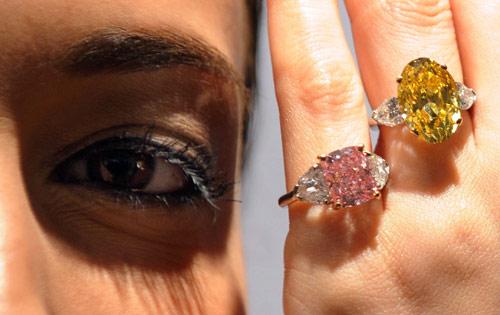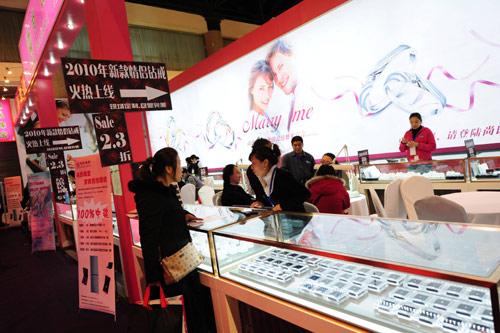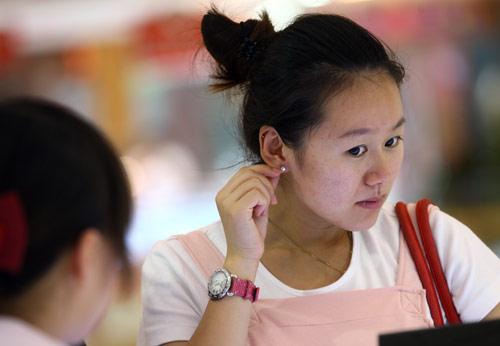
Beijingers are seeing diamonds as a good investment besides stock and property markets. [MIKE CLARKE / FOR CHINA DAILY]
If you ask Beijingers about the two things they are most interested in from South Africa, they are likely to say the World Cup and diamonds. With football fans yelling, singing and dancing as they have watched the performances of the 32 national soccer teams in the World Cup in recent weeks, South Africa has certainly grabbed a lot of short-term attention.
But Beijingers' long-term interest is increasingly being snared by the idea of buying diamonds and treating them as investment products.
Diamond sales in Beijing have surged since May, the season along with June that Chinese people typically choose for their weddings. Part of the reason for the surge is the fact that newlyweds were buying more rings containing the sparkling gem.
Beijing's largest diamond marketplace - M&L plaza - saw a 30 percent rise in revenue in May and June, compared to previous months.
Other department stores, such as Gongmei Group, Beijing Caibai and Hiersun Diamond Plaza, have all experienced a revenue rise of between 20 percent and 40 percent.
Buying diamond wedding rings is becoming increasingly important for young Chinese couples, according to research conducted by Hiersun, a leading Chinese jewelry company that claims around 80 percent of Chinese couples in some big cities now buy diamond rings when they tie the knot.
However, industry experts say the sharp rise in diamond sales is about more than a growing trend to buy diamond wedding rings; people are seeing diamonds as a good investment.
Sales officials from M&L said wealthy people from provinces including Shanxi, Zhejiang, Jiangsu and Inner Mongolia are the ones buying up most of the capital's diamonds.
The buyers are especially interested in unset stones.
"I clearly remember a Shanxi client purchasing nine loose diamonds at one time in our store, paying 3 million yuan in cash," said Li Pengcheng, market director of M&L.
Similar purchases of unset diamonds have become common recently, said Li.

A customer chooses diamonds at a jewelery center in Beijing. [Bao Fan / for China Daily]
He said it might be because of the recent sluggish performance of the stock market and property market, causing investors to divert their money into other profitable channels.
Qiao Haitao, marketing director with popdiamond.com, one of the largest diamond transaction websites in China, said a Beijing woman bought a four-carat diamond for 1.28 million yuan in April.
The sale was the largest online transaction nationwide at the time.
The woman later participated in a CCTV interview and said the deal was a good one for her.
"In future, if I mortgage this diamond, it will be mortgaged at its market price, and the price could be far above the figure I purchased it for," said the woman, who is surnamed Yang and who works in the financial industry.
The Beijinger has become known among netizens as "zuiniu wanggou nu" (or most powerful online buying woman).
In total, around $3 billion-worth of diamonds were sold in China last year, according to statistics from the Gems & Jewelry Trade Association of China.
The volume of diamonds bought surpassed that of Japan and took China to second place in the ranking of diamond importers worldwide, behind the United States.
Sales of diamonds suitable for investment - usually those with a weight of more than one carat - are likely to increase by 40 percent this year, the association said. It is possible that more than 100,000 diamonds heavier than one carat will be sold in China within the year, the association estimated.
There are several reasons why Chinese people are increasingly favoring investing in diamonds.
Firstly, the supply of diamonds is limited and diamond prices have rebounded since the global financial crisis started in 2008.

A woman tries a pair of diamond earrings at a wedding expo in Beijing. [Zou Hong / China Daily]
By mid-June, diamond prices had vaulted to their highest level since November 2008, according to PolishedPrices, an international diamond information provider. Its overall index of diamond prices is now 9 percent above the starting level for the year and around 11 percent higher than the same time last year.The availability of diamonds is likely to decline in the future because few new mines have been discovered in the past 20 years, says the world's largest diamond company, De Beers.
"Due to the supply reduction in the following five years, diamond prices are about to rise by at least 5 percent annually," said Shao Zengyi, diamond analyst at the Beijing International Jewelry Transaction Center.
However, potential risks also exist for those investing in diamonds.
Compared with foreign countries that have fluid and transparent diamond markets, Chinese investors might find it difficult to sell their stones domestically because such channels in China are not available.
At present, few auction houses conduct diamond transactions and, if investors take their precious stones to pawnshops, they may only be able to get one-third of their value.
In order to calm investors' fears about reselling their diamonds and to boost diamond sales, domestic department stores have begun buy-back programs.
M&L became the first diamond seller in Beijing to offer to buy back stones it had sold.
In May, the store said its clients could sell their diamonds back to the company for at least the original purchase price.
In spite of the buy-back offer, the difficulty in reselling stones is holding back some would-be investors.
"Yes, I admit diamonds are precious and the resource is facing exhaustion but diamond trading is not as easy as stocks, houses, and even harder than gold bars," said Yang Dong, a financial analyst who works in Beijing's Central Business District.
"I don't think all diamonds are suitable as investments. For example, auction houses like big and flawless diamonds, instead of small and poor-quality ones, so people should not be blind about picking up their stones."





